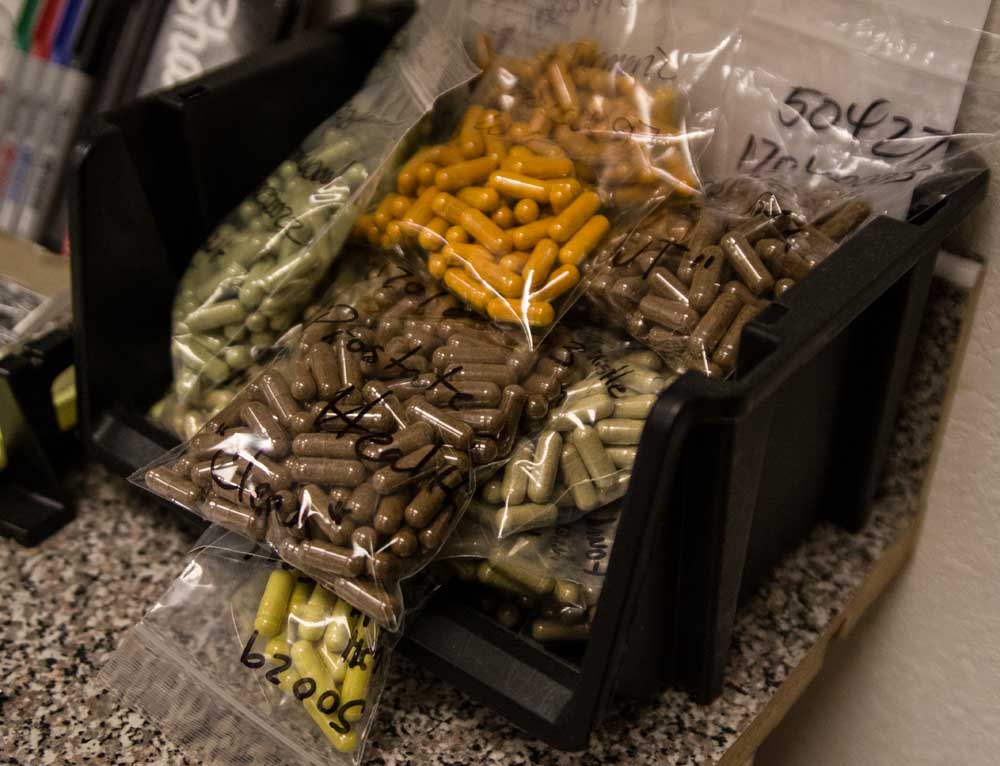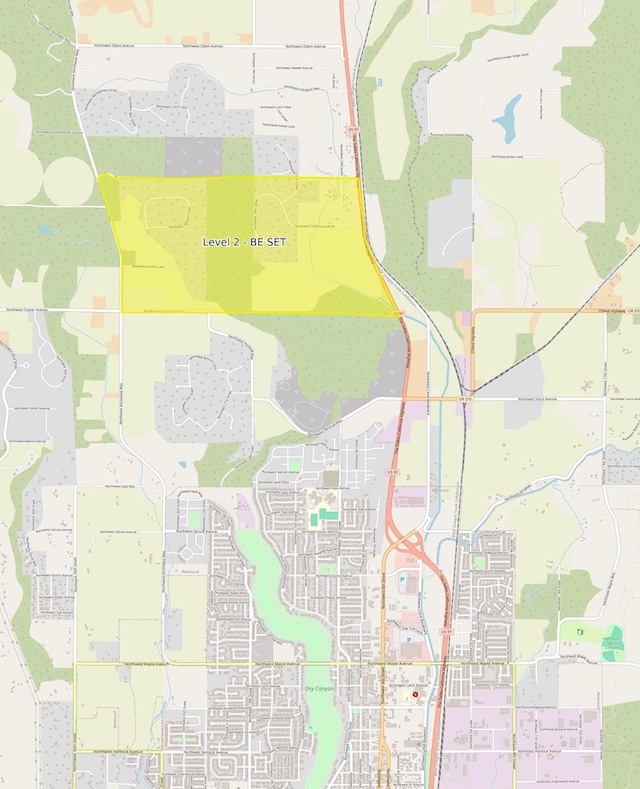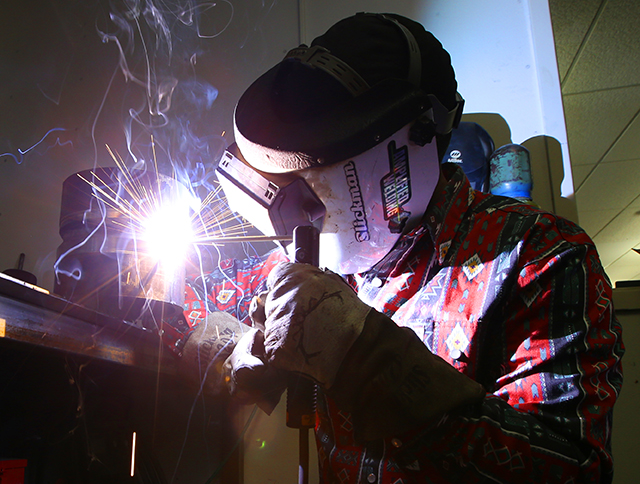No Headline
Published 12:00 am Wednesday, March 15, 2017

- LEFT: Each batch of capsules is thoroughly tested at the in-house lab at Oregon’s Wild Harvest. (Colby Brown/Spokesman photo)
Farm to table is a popular motif for small, local farms throughout the country. But farm to capsule is a bit of a niche comparatively, and is one that independent, family-owned Oregon’s Wild Harvest has capitalized on.
The Redmond-based producer of herbal supplements gets nearly half of its raw material from its local farms in Culver. Its herbal supplements are available nationwide and set a standard for the competition. And it’s one of many manufacturing and production companies that call Redmond home.
Pam and Randy Buresh founded the company in 1992 in Sandy. They lived on a small, 17-acre farm where they were able to produce 12 encapsulated herbal supplements in their extraction lab in their garage. In 1994, they adopted the current name Oregon’s Wild Harvest, as well as moved to a larger production facility.
“We just couldn’t keep up with the growth,” Randy Buresh said.
Two years ago, the Bureshes uprooted the company from Sandy and moved to Redmond, as well as acquired two farms near Culver — a 137-acre and a 147-acre farm. They also have about 100 acres in Sheridan for crops that aren’t able to grow in the High Desert.
“It gives us the ability to provide a greater range of products that we can grow out here in the great Northwest,” Randy Buresh said.
All of their farms are certified organic. The company has 50 employees and ships its products nationally. Randy Buresh said the company has seen a steady growth rate of nearly 20 percent, growth that he also said is difficult to keep up with.
“Sometimes I feel like we are Oregon’s best-kept secret — we’ve kept our heads down and we have been working hard, and it’s paying off,” Randy Buresh said.
The production facility is nearly 50,000 square feet, at 1601 NE Hemlock Ave., and has the ability to add another 30,000 square feet of space if growth continues. Randy Buresh said he can almost guarantee they will need it in the next five years. They also want 70 percent of the raw material they use to be produced from their own farms. It’s currently at about 40 percent for encapsulated forms, 80 percent for their extracts and 100 percent for the biodynamic products — the majority coming from capsules and extracts. They offer more than 200 products in biodynamic herbal tonics, capsules, liquid extracts and specialty items. Buresh said they ship hundreds of orders a day and have seen about a 15 percent increase in revenue since moving to Redmond. It’s no wonder the company’s major hurdle has been keeping up with demand.
“We’ve gone from a quiet little country company, to very busy company,” Randy Buresh said.
Pam and Randy Buresh started humbly, harvesting thousands of pounds of wild plant material themselves, packing it on ice and shipping it out to production facilities. That was before they founded Oregon’s Wild Harvest and also where they found their name. Now the company processes thousands of pounds of raw material a week.
“It’s been great,” said Nate Couture, production manager for Oregon’s Wild Harvest. “There has been a lot of growth, and that has been the reigning theme. The company has just grown and expanded very quickly.”
Couture has worked for Oregon’s Wild Harvest for 18 years and moved to Redmond with the company.
The demand isn’t slowing for Oregon’s Wild Harvest, but neither is the Bureshes’ demand for high-quality products. Every batch of material is tested multiple times throughout the processing cycle at the production facility. From raw material, to milled and crushed, to concentrated capsule or extract, everything is stringently tested for purity; contaminants; and E. coli, salmonella, yeast and mold — and the company has never failed an inspection by the Food and Drug Administration. Buresh said the FDA sometimes uses their facility as an example for training purposes. And since herbal supplements are also considered a food, the company is regulated as a food producer by the Department of Agriculture. It is also regularly tested by a third party, Oregon Tilth, a nonprofit certifier and educator for organic agriculture and products. Buresh attributes the focus on quality to the demand for their product.
“We are very heavily regulated, and I don’t think people recognize how regulated we are,” Randy Buresh said.
The Bureshes have created an atmosphere of attention to detail, as well as family, within their company. Multiple employees from Sandy moved with the company two years ago. Buresh said he wants his employees to feel like they can grow with the company, that it isn’t just a production facility. But a difficulty Buresh said they encounter is keeping a qualified workforce. They have experienced turnover of employees from wage competition in the area. Buresh sums that to a growing pain of the company — one they have adapted to.
“It’s been a constant learning experience,” Couture said. “We started small, and we adapted as the demand for our product expanded.”
Buresh said the most important thing is finding employees to care about the product they make.
“My feelings are that I want our employees to feel like this is important, and also that this is their future, too,” Randy Buresh said. “We’re making things that go to help people, help people get well.”
The Bureshes made the decision to move to Redmond because of what Randy said was an open arms attitude from the Redmond community. They also performed their own soil tests in the area before acquiring their farms, and they were surprised by the results.
“When we tested the soil here it was like, ‘Wow, this is good stuff, the soil is clean,’” Randy Buresh said. He added that some of the soil on the west side of the Cascades has higher contaminant concentrations from previous use as nurseries.
Buresh said the Redmond government’s attitude toward moving his company to the community was a driving point of why he chose Redmond. He said working with the Redmond government was beneficial to his company in moving to Redmond, and that it isn’t just his company that benefits. Medline, which already has a presence in Redmond, is building across the street from Oregon’s Wild Harvest.
“It was amazingly easy,” Randy Buresh said about working with the Redmond government. “They opened the door to us, and the people in Redmond were right there for us. It was so much better than where we came from. They acknowledged us, and that is what makes Redmond such a special town because they welcome us to the town.”
“It was a big part of why we chose to move here,” Randy Buresh said. He added that the conversation was “what can we do to help” instead of “fill out these forms and come back when you’re ready.”
The company aims to continue the growth it has seen, at 20 percent, and it’s looking at international sales. It has offered products in Japan and Canada before but is currently focused on meeting the demand of national sales. But the company expects to stay in Redmond and continue to offer Northwest-grown herbal supplements to the rest of the nation.
“Our potential for growth is great; we have everything in place,” Randy Buresh said. “We know how fast we have been growing, and if we can maintain that then it’s going to be really good, and even harder to keep up with.”





